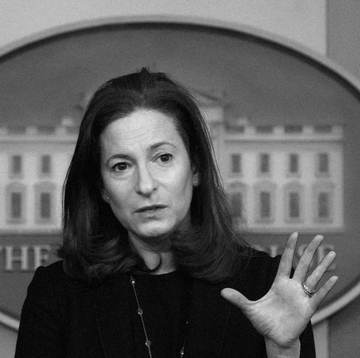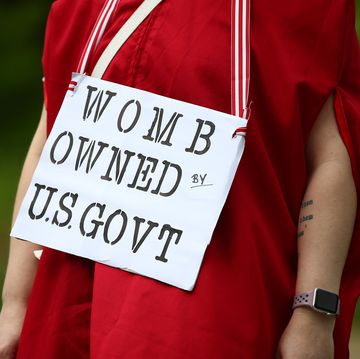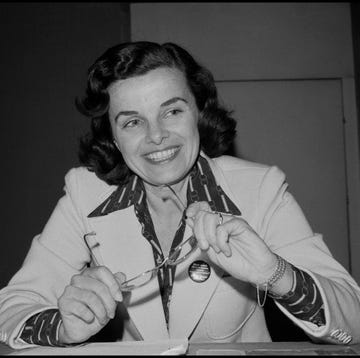Do you like politics at your dinner table? Then RENDER is for you. The new quarterly food magazine highlights women in the industry and takes on everything from butchery to "offal for basic bitches" through a feminist lens. RENDER founder and creative director Gabi de Leon, executive director Danielle Knott, and editor-in-chief Lisa Knisely talked to Cosmopolitan.com about making food culture accessible, the Paleo diet, and life in feminist food-land.
Where did the idea for RENDER come from?
Gabi de Leon: RENDER is the product of my four years spent confronting my disordered eating while attending Pacific Northwest College of Art (PNCA). I developed anorexia in my first semester and recovered before my second semester, but that didn't mean that I was "better" or that I was eating like "normal." My eating habits continued to be, to this day, very disordered — that is, obsessive, restrictive, and extremely stressful. And I was really obsessed with food. I'd say about 95 percent of my assignments at PNCA were food-related, no matter the prompt. I drew inspiration from food and homemaking magazines. I looked at everything from Real Simple to Bon Appetit, and when Lucky Peach came out, I went crazy. This whole "boutique" magazine fad started happening, and I realized that that's what I wanted to make as an illustrator and designer — pretty food magazines. Women's representation in food culture is what led me to the magazine's title, RENDER. I wanted to change the way women were "rendered" — portrayed and depicted — in food culture. And "render" is a food word, and it also alludes to how you create an artwork, and I was an art student, so I thought it was clever.
Danielle Knott: We wanted to create a food magazine that talks about the economic contributions women make to all aspects of the food industry — not just celebrity chefs and homemaking and dieting. Gabi has aspirations of becoming a butcher in addition to her work as an illustrator, so she wanted to create a magazine that incorporated both of her loves.
Tell me about the first issue, which came out this fall.
Lisa Knisely: The first issue is the Flesh issue. There are a few things I'm particularly excited about: an interview with Camas Davis from Portland Meat Collective that talks about both the personal and political aspects of butchering your own meat and the relationship to body politics. We publish a bunch of different perspectives on what it means to eat meat and to live in a body, especially as women, who are under so much pressure when it comes to their bodies. There seems to be a disconnect between the discourses around body politics and food journalism. They're so obviously connected. I have a piece in the Flesh issue about what it's like to be a foodie who is also fat and how that changes peoples' perceptions of my taste level and expertise.
How does feminism fit into your vision?
de Leon: The food industry is still pretty male-dominated. I want RENDER to empower women in the food industry, and I want RENDER to empower everyone with a rich and educated relationship with food. A lot of magazines are completely unrealistic, unless, of course, you've got all the money and time to spend on a lifestyle so picturesque. One thing you won't see with RENDER are stark white, thick stock pages with sparse writing and too many full-page photos of the most perfect mismatched rustic dinner table set up in the woods with someone in plaid staring in the distance.
Knott: We aren't shy about the fact that we are focusing, not exclusively but predominantly, on women and their experiences in the food industry, their cookbooks, their farms, their lives, and how all of that relates to food. That's something that doesn't get enough attention in the food magazines that are on the market — you see very few female faces.
What makes RENDER different from other food magazines?
Knisely: One thing that made me really excited is that as Gabi and Danielle were talking about the magazine, they weren't afraid to make it political. For example, one of the articles about the Paleo diet is written by a naturopath, and she analyzes who has the accessibility to really eat a Paleo diet: who has those foods in their neighborhood, how much it costs, how much time you have to put into it, whether it's a feasible long-term eating plan, and how it's been marketed to women as a weight-loss plan. We have another piece that looks at the links between masculinity and the Paleo diet, and this idea of caveman-style all-meat eating. Those are two examples of how we are situating food in a larger cultural context, and how the choices we make about how we eat are not just aesthetic or taste choices. They're very social and political choices as well.
de Leon: RENDER is devoted to accessibility, in several ways. As far as cost goes, yeah, I was inspired by boutique food magazines. But I don't want this magazine to be a $10 to $20 book printed on thick stock, meant to be a coffee table accessory. I believe that feminist food discussion is important, and I want it to be affordable.
Are you hoping to change the food industry?
Knott: In showcasing a variety of female experiences within the food industry, we hope to help create a network of solidarity, where hopefully women who are in the food industry feel as though their experience isn't singular and they can take action in their own lives to feel empowered in their work environment.
Knisely: I think ideally the magazine would change some people in the food industry's idea of who their ideal customer is — it would be more diverse and more expansive. There are a lot of people in the food industry who imagine their customer is affluent and probably white — you see that in the aesthetics of the specialty coffee shops that pop up across the country. That's the customer people in the food industry imagine can pay for what they're doing or would be interested in it, because that customer is within their own class and race group and has similar cultural capital. I think that's a mistake. When it comes to the coffee shops I frequent, I have some friends who are like, "I don't like it there because I don't feel comfortable," and they say, "It feels super rich," or, "I feel too queer," or, "There's only white people in there." I think those critiques are valid.
What aspects of food culture do you find particularly interesting right now?
de Leon: Well, one huge thing I think is just crazy is my city's food culture. I live in Portland, Oregon, which is like a city-size food court. I am, at all times, within a mile of the best coffee I've ever had and at least five amazing, nationally known restaurants. Many new restaurants, bars, and coffee shops have a very specific, very Portland aesthetic. Atmosphere and branding are as well designed, if not more, than the food. It's actually getting kind of annoying. Restaurants are starting to look pretty uniform, and there's a sense of pretentiousness that I expect at a lot of places.
Knott: Something I have been really intrigued by is this idea of supper clubs and un-restaurants. I like the fact that there are people who are interested in creating a more holistic experience, where it's about the people you're dining with as much as it's about the food, and you could be anywhere in the city it pops up in. It gives people who are really passionate about food and cooking a more economically viable opportunity to get their foot in the door.
de Leon: I also think it's interesting that restaurant kitchens are the place to be, as far as careers go. When I was a kid, everyone I knew who worked in a restaurant, mainly my parents, complained about it all the time. I promised myself I'd never work in the food industry as a career, but now I work in a kitchen, and I love it, and I've been working my way up on the food chain, from dishwasher, to prep cook, and beyond. And I think it's cool that even though print is apparently dying, food literature is thriving. Cookbooks and food magazines are more beautiful than ever.
Knisely: I'm super excited about the Timing issue too. In particular for people who fall into the Millennial generation, we're figuring out alternative ways of living, and that's certainly happening in food. We had a piece on the blog by Soleil Ho about her decision to leave her English writing master's program and go back to the kitchen. And across the food industry, people are taking food careers to be professional careers; there's a push to say that this is a legitimate life path and a career, not just something I'm going to do until I get my college degree or my master's.
Follow Jill on Twitter.

Jill Filipovic is a contributing writer for cosmopolitan.com. She is the author of OK Boomer, Let's Talk: How My Generation Got Left Behind and The H-Spot: The Feminist Pursuit of Happiness. A weekly CNN columnist and a contributing writer for the New York Times, she is also a lawyer.













